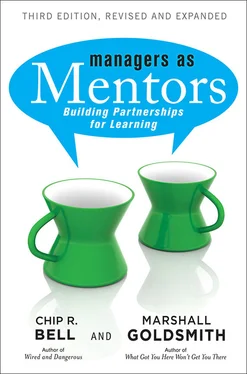The main thing to remember is that this book is grounded in a partnership philosophy. It has no secrets aimed at making you look good to an unknowing subordinate, and we hope you will share it with your colleagues and associates and protégés. The more you know about how to mentor, the better the mentoring relationship will work for you. The same is true for the protégé. Some have found discussing the book helpful in improving the process of mentoring. Do what works for you.
Managers As Mentors , ReVISITED
We are big fans of new. We rarely go to the same restaurant twice, even if it was a great experience. The concept of a time-share – returning each summer to the same condo – leaves us absolutely cold. Why, we won’t even eat leftovers unless the only other option is to skip a meal!
This is the third edition of this book. You would think we would abhor the idea of spending time on the “leftover” version of a book. But we were excited by the opportunity! This edition is not a warmed-over version of yesterday’s dish, served up with a different sauce on the side. We think you’ll discover it has enough new and different ingredients not to be considered a leftover at all; rather, it is a completely new experience.
This new version is different in a number of ways. There are many chapters in this edition not found in the first or second. We have learned a lot both from the feedback of readers of the second edition and from participants in the mentoring workshops we have conducted and keynote speeches we have delivered. They helped us crystallize our thinking and enabled us to get a lot clearer on concepts that were somewhat vague in the second edition. We are grateful for the learning they provided us.
You will discover soon that Managers as Mentors is crafted around a mnemonic – SAGE – that forms the structure of the mentoring experience as we see it. Surrendering (S) is all about actions that make mentoring a power-free experience. We have learned that power, authority, and command – or at least the protégé’s perception of these traits in the mentor – can doom the mentoring experience to a perfunctory dialogue … sans risks, sans spirit, and sans discovery.
Accepting (A) in the SAGE model focuses on the value of a safe, nontoxic relationship. When the protégé believes he or she is in a relationship that is not dangerous, growth-producing risk and experimentation are more likely to occur. The perception or prediction of danger is related not to physical harm but rather to the emotional damage caused by rebuke, judgment, or criticism – all of which yield a loss of protégé self-esteem in front of an important person. Why is this important? Without risk there is no learning; without experimentation there is no progress.
Gifting (G) is positioned as the main event in mentoring. Many mentors start their mentoring relationships with a gift of advice, feedback, or focus. However, when offered as the first step in the relationship, the act of bestowing such gifts risks their being at best undervalued, at worst ignored, resisted, or rejected. If Gifting follows Surrendering and Accepting, it is more likely to be experienced by the protégé as a sincere gesture and a valued contribution worthy of attention, tryout, and effort.
Extending (E) in the SAGE is about the creation and nurturance of the protégé as a self-directed learner. It is also about ways to extend the learning of the protégé beyond his or her relationship with the mentor. Essentially, it is shepherding the transfer of learning.
Why Mentoring Is Important … Today
Organizations scramble to attract and retain skilled employees. Mentoring can be a powerful weapon useful in winning the war for talent. And both the flattening of organizations and the transformation of the role of boss have left many managers in an identity crisis. Having risen up the hierarchy by virtue of their command and control skills, they enter a world where bossing is now about coaching and partnering. This book offers a new perspective on roles and competencies for bosses as an alternative to what it has meant historically to be in charge.
Organizations have always operated in a competitive arena. Whether vying for a share of an economic market, a share of the customer’s loyalty, or a share of the resources doled out by some governing body, organizations operate in a contest mode. In today’s race, the winners are those that prove themselves more adaptive, more innovative, and more agile. These are the organizations populated by employees who are always learning, led by managers who are always teaching. So at a macro level, this book is about achieving organizational success.
When Managers as Mentors first came out, the concept of the “learning organization” was new and popular. Peter Senge was the new management guru, and his groundbreaking best-seller, The Fifth Discipline , was required reading for all contemporary, forward-thinking executives. We have today moved past the fad stage of a learning organization. 1 1 Peter Senge, The Fifth Discipline: The Art and Practice of the Learning Organization (New York: Doubleday, 1990).
The landscape of enterprise now is shaped by the dearth of talent, the pace of change, and the transformation of what it means to be in charge – all operating against the backdrop of a challenging economy. This new landscape has put “helping employees grow” at the top of the list of critical success factors for all managers. Consequently, this book is more important today than it was when it first appeared in hardback in the fall of 1996.
As mentoring has grown in importance since then, so have the specifications for mentoring tools. Managers today want proficiency without having to buy into a program. They seek helpful resources and techniques, not hindering rules and policies. Explorations of philosophy and theory might be tolerated after hours, but in the middle of challenge and the heat of contest, managers shun any instruction not immediately transferable to their everyday practice.
Mentoring as an Art
The mentor is a teacher, a guide, a sage, and foremost a person acting to the best of his or her ability, in a whole and compassionate way in plain view of the protégé. No greater helping or healing can occur than that induced by a model of compassion and authenticity. Mentoring is about being real, being a catalyst, and being sometimes a kind of prophet. It is therefore far more art than science. It is about personal power, not expert or role power. The most powerful and most difficult part of mentoring is being who you are.
This is not to imply that a mentor must be some kind of super-hero without flaws, doubts, or the capacity for making mistakes. Fundamentally, mentoring is about growing – mentors growing with protégés, protégés growing with mentors. The core of a mentoring relationship is more about a mutual search than about imparting wisdom. As a collective pursuit, mentoring works best when mentors are focused on building, not on boasting.
The anthropologist Carlos Castaneda used the word “magic” to describe his unique mentoring relationship with the Yaqui medicine man Don Juan – and truly there is a magical quality to the mentoring process when it takes on a life of its own and leads mentor and protégé through an experience of shared discovery. 2 2 Carlos Castaneda, The Teachings of Don Juan: A Yaqui Way of Knowledge (Berkeley: University of California Press, 1968).
The challenge of helping another see things in a new way has had many labels down through the centuries. Biblical writers used fishing analogies to capture the spirit of mentoring magic and told of removing scales from eyes. The philosopher Ram Dass referred to it as “a dance.” 3 3 Ram Dass (Richard Alpert), The Only Dance There Is (Garden City, NY: Anchor Press, 1974).
Buddha said, “One should follow a man of wisdom who rebukes one for one’s faults, as one would follow a guide to some buried treasure.”
Читать дальше












